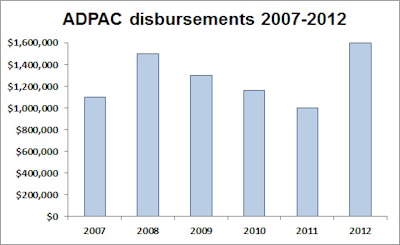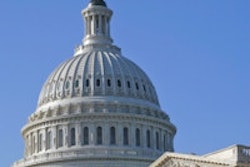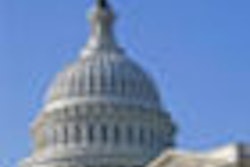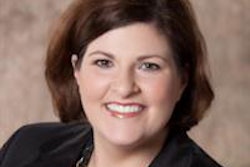
The ADA's political action committee (ADPAC) spent a record $2 million on campaign contributions in 2012, a 60% increase from 2011, according to its first annual report.
ADPAC received $3.7 million from 2011 to 2012 and contributed $2.6 million to political candidates and committees, and it received $1.17 million from ADA members in 2012 and contributed $1.6 million to federal candidates and committees, according to the report.
The ADA also spent $322,784 on "super" PAC ads for candidates in 2012 for a total of $1.97 million, according to report by the Center for Responsive Politics (CRP). The only medical association that received and spent more for campaign contributions in 2012 was the American Association of Orthopaedic Surgeons, according to the ADA report.
 Total ADPAC disbursements from 2007 to 2012. Source: Federal Election Commission.
Total ADPAC disbursements from 2007 to 2012. Source: Federal Election Commission.The ADA's political spending priorities include the following:
- Ensuring that healthcare reform does not adversely impact dental practices and patients and maximizes access to care
- Amending federal regulations to exempt most dentists from being required to sign up with the Medicare program when referring such patients to specialists
- Opposing 2013 federal funding for the alternative dental health care provider demonstration projects
"At ADPAC, we are committed to providing our members with clarity on PAC activities and accomplishments, and financial transparency is just one of the ways we practice good business," ADPAC co-chairs Loren Feldner, DDS, and Gordon Isbell, DMD, stated in the report. "ADPAC is part of the personality of dentistry in America and the influential force behind our country's healthcare debates. The PAC empowers ADA members to take action and be involved in the political process by helping to elect candidates who share our principles."
The report added: "ADPAC considers many factors before contributing to a candidate for the U.S. House or U.S. Senate. Among these are the committee assignments, accessibility in Washington and in the state/district, leadership positions and positions on dental issues. No incumbent or candidate is entitled to receive funds. States may always choose to not give to an incumbent."
The ADA and its state chapters have become major political players by spending $39 million since 1999 to influence U.S. lawmakers and legislation, according to the National Institute on Money in State Politics, a nonpartisan campaign research group.
Among other things, the lobbying efforts aided the ADA's successful fight several times to defeat a component of the healthcare reform law that would have funded midlevel provider demonstration projects. The ADA successfully defeated federal funding for the projects again in this year's budget, and the issue remains one of the ADA's top priorities, according to the ADPAC report.
The spike in ADA spending on lobbying efforts took a noticeable jump in 2008 when healthcare reform became a major topic of discussion in the presidential primary campaigns, according to the nonpartisan Center for Responsive Politics. From 1998 to 2007, the ADA never spent more than $500,000 annually on lobbying.
In fact, the ADA's donations to candidates have earned it a ranking of 49 on a list of 100 top all-time donors from 1989 to 2012, according to the CRP.



















